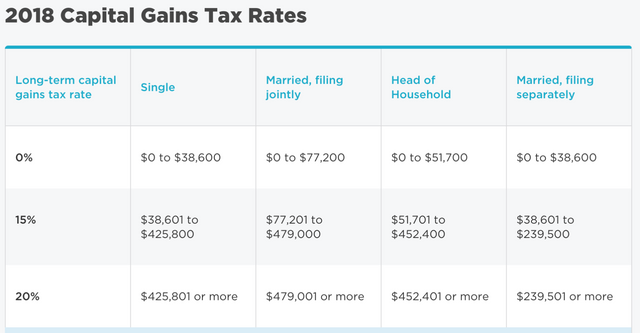How Much Profit Can You Make In Crypto Before Having To Pay Taxes

It is that time of year many a self-employed person dreads, the deadline to submit your tax returns and pay anything you owe. But this year there is a question a select few should be asking themselves - have I profited from my investment in crypto-currencies?
If you have, you could be liable for tax.
Before we dive into the nitty-gritty, we have to understand the difference between long-term and short-term capital gains, which depends on how long you owned the asset. Short-term capital gains tax rates are equal to your ordinary income tax. Long-term capital gains tax rates, which usually come into play on investments you’ve held for longer than a year, are much less onerous; many taxpayers qualify for a 0% tax rate.
On Dec. 20, 2017, the Congress passed a sweeping overhaul of the U.S. tax code, with President Trump promising to sign it. The new rules do not change long-term capital gains tax rates themselves — for the 2018 tax year they’re 0%, 15% and 20%, the same as for 2017.
But the thresholds have changed.

Source: Nerdwallet
In other words, as long as you HODL your digital assets for over a year without cashing out on your profits, you will not have to pay taxes unless your profits are above $38,600.

Some Exceptions
You might still incur a taxable event even if you don't formally cash out. Anyone using cryptocurrency to pay for goods or services must treat each purchase as a sale or even trading one cryptocurrency for another. I know there's confusion over this treatment, but think of it like this: If you trade in your Amazon shares for Microsoft shares, that's a taxable transaction, even if you don't take cash out of your brokerage account. The same analysis applies to cryptocurrency trading - if you trade Ripple for Ethereum in order to buy other ERC20 tokens, that's a taxable transaction.
There used to be a loophole (also known as the 1031 Loophole) where there was a gray area surrounding whether crypto-to-crypto transactions are what the IRS calls “like-kind” transactions, which allow you to defer paying taxes on transactions where one property is exchanged for another, similar property. However, this loophole was amended last December, and starting Jan. 1, 2018, all cryptocurrency trades will be subjected to taxes, and this includes the exchanging of one cryptocurrency to another.



This is a great high level summary of the income tax implications of investing in cryptocurrency. Depending on the facts and circumstances of the individual, however, it can get so much more complicated.
Thank you for the feedback! And yes, I totally agree - when you take into account day trading and other extraneous factors, the whole equation becomes really untractable.
I love those coins ive used them in a few pieces of art! I hope to get plenty wealthy with cryptocurrency under the tax watchers eye. I unfortunately did loose a lot in the Bitconnect scam.. Imm hoping I will be able to build myself back up by using steem. I really think its the future of social media and cryptocurrency.
NMF
Wow, that's some quality art right there! I'm sorry for your loss with Bitconnect, but I'm sure you'll cover your losses with Steem - it's a legit platform with lots of supportive users who share the same aspirations as you! Good luck, and let's stay in touch!
yea and that loophole for 10-31 exchange includes filing massive amounts of paperwork for each like kind exchange with docomentation from a professional showing they are very similar assets, filed within 45 days of said exchange. So unless you did mountains of paperwork last year, the 1031 exchange still won't work. Unfortunate but true
Oh boy, that sucks. Taxes got us all like:
A lot of value here man, a lot of people are worried so your article will help greatly. That said, it is a prime opportunity to revisit the history of a certain notorious tax agency, how it got started and why.
There is a lot more to uncover
Thank you for the feedback! I agree - there has been a lot of uncertainty and gray area regarding the filing of taxes for cryptocurrency profits. And I totally agree - that really helps you get to the core of the issue.